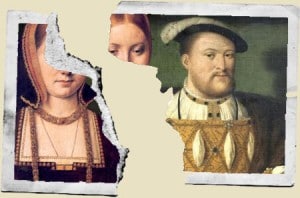 Now we’re leaving the “bloody days” of 1536 and going back in time to 1533 when Anne Boleyn was queen consort and waiting to be crowned.
Now we’re leaving the “bloody days” of 1536 and going back in time to 1533 when Anne Boleyn was queen consort and waiting to be crowned.
On 23rd May 1533, Archbishop Thomas Cranmer declared that Henry VIII’s marriage to his first wife, Catherine of Aragon, had been annulled:
“My lord of Canterbury gave sentence this day at 11 o’clock in the great cause of matrimony; has declared it to be against the law of God, and has divorced the King from the noble lady Katharine. He has used himself in this matter very honorably, and all who have been sent hither on the King’s behalf have acted diligently and towardly. Sentence shall be given for the King’s second contract of matrimony before the Feast of Pentecost. The process is partly devised. 23 May.”1
Cranmer had been consecrated as Archbishop of Canterbury on 30th March 1533 and his first duty as Archbishop had been to preside over the convocation meeting to discuss the validity of the Henry VIII’s marriage to Catherine of Aragon, his brother’s widow. On the 5th April 1533, Convocation determined “1, that the Pope has no power of dispensing in case of a marriage where the brother’s widow has been cognita. The house consisted of 66 theologians. The proxies were 197; the negatives 19. The second question was, whether Katharine was cognita. The numbers present, 44; one holding the proxies of three bishops. Decided in the affirmative against five or six negatives.”2
On the 11th April, Cranmer wrote to the King, “Beseeching the King very humbly to allow him to determine his great cause of matrimony, as belongs to the Archbishop’s spiritual office, as much bruit exists among the common people on the subject”3 and the King replied the next day:
“Received on the 12th April his letters dated Lambeth, 11th April desiring leave to determine his great cause of matrimony. Cannot be displeased with Cranmer’s zeal for justice and for the quieting of the kingdom; and although Henry is his King, and recognises no superior on earth, yet as Cranmer is the principal minister “of our spiritual jurisdiction,” and is so in the fear of God, cannot refuse his request. Gives him licence accordingly by these letters under the sign manual, sealed with the King’s seal.”4
This gave Cranmer the official permission he needed to open a special trial into the annulment proceedings, which he did at Dunstable Priory, Bedfordshire.5 After hearing testimonies from people such as Dr John Bell, the King’s proctor; the Dowager Duchess of Norfolk and Lady Jane Guildford (both ladies refused to travel to Dunstable but depositions were taken), the opinions of universities and Convocation, and examining the proceedings of the Legatine Court at Blackfriars, the court came to a decision and gave their sentence on 23rd May. Archbishop Cranmer sent the King notification of the sentence:
“Notification of the sentence of divorce between Hen. VIII. and Katharine of Arragon pronounced by archbishop Cranmer. Dated in the monastery of Dunstable, 23 May 1533. Present, Gervase prior of the said monastery, Simon Haynes, S.T.P., John Newman, M.A., and others.
The matrimony between the King and the lady Katharine being dissolved by sufficient authority, all pactions made for the same marriage are also dissolved and of none effect. That is, the jointure shall return again to the King’s use, and the money paid to him by her friends shall be repaid to her.
The matrimony being dissolved, the lady Katharine shall return to the commodity and profits of the first matrimony, and the pactions of the same, made with prince Arthur, and shall enjoy the jointure assigned to her thereby, notwithstanding any quittance or renunciation made in the second pact. For as these renunciations were agreed unto for a sure trust and hope to enjoy the commodities and pactions of the second marriage, which now she cannot enjoy, unless without fault she should be deprived of both, equity and right restore her to the first. This, we think, by our poor learning, to be according both to canon and civil law, unless there are any other treaties and pactions which we have not seen.
For the more clear declaration hereof, we think that when a matrimony is dissolved, if there is no paction of a further bond, then by law the money paid by the woman or her friends shall be restored to her, and the jointure return to the man and his heirs. In this case there is an especial pact that she shall enjoy her jointure durante vita, so that the said jointure is due to her by the pact, and the money paid by her and her friends by the law.”6
On 28th May 1533, Cranmer declared the marriage between Henry VIII and Anne Boleyn valid and on the 29th May the coronation pageantry began, culminating with the crowning of Anne Boleyn at Westminster Abbey on 1st June 1533.
Notes and Sources
- Letters and Papers, Foreign and Domestic, Henry VIII, Volume VI. 525, Letter from John Tregonwell to Cromwell, 23rd May 1533.
- Ibid., 311.
- Ibid., 327.
- Ibid., 332.
- Ibid., 463.
- Ibid., 529.